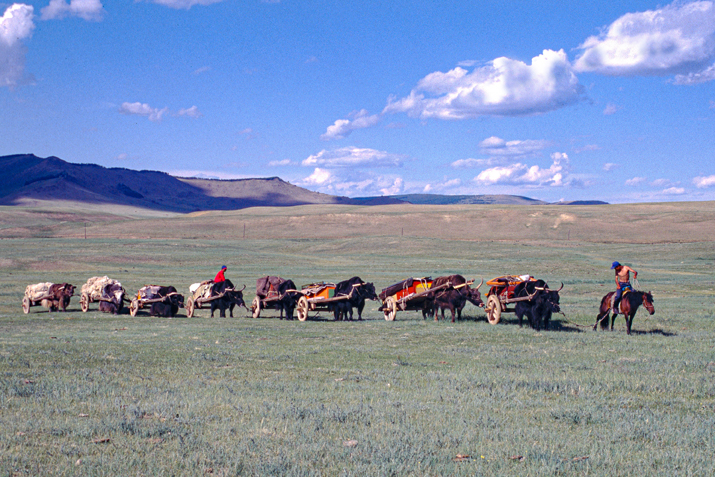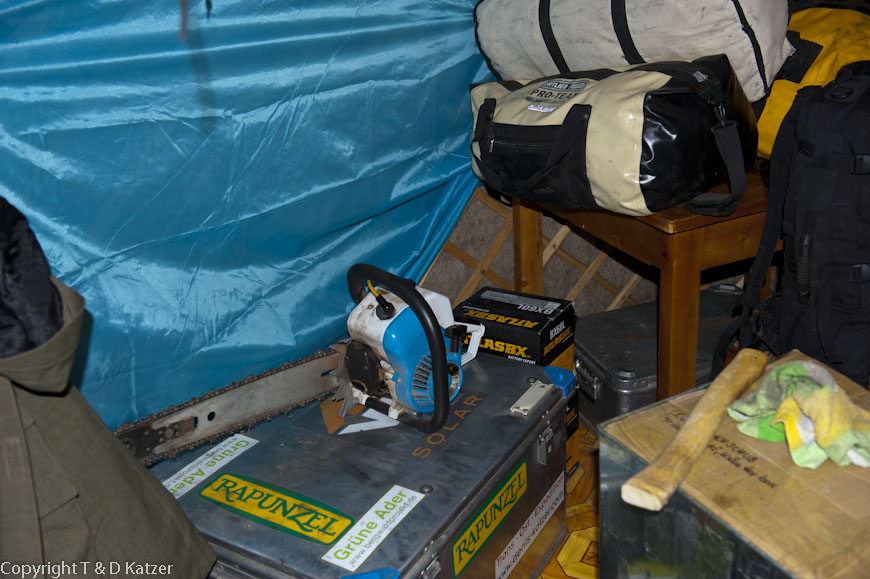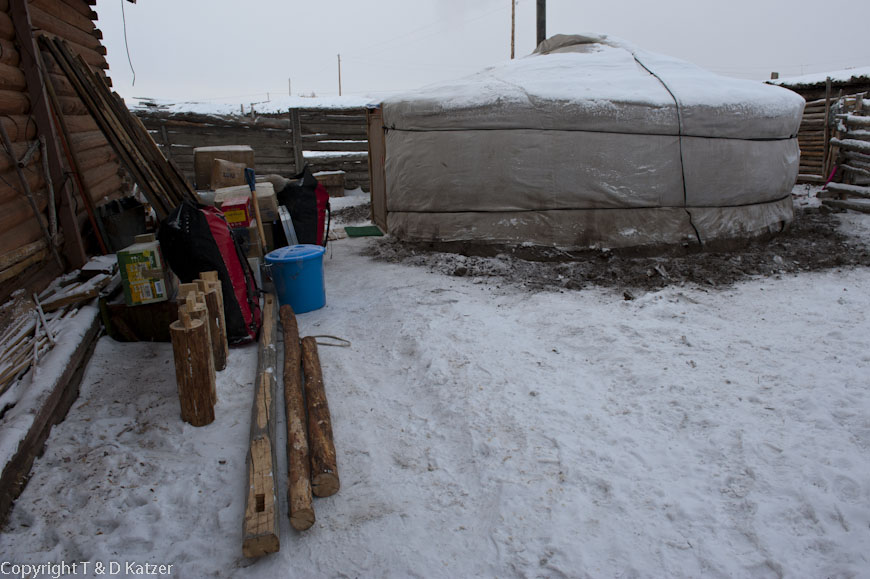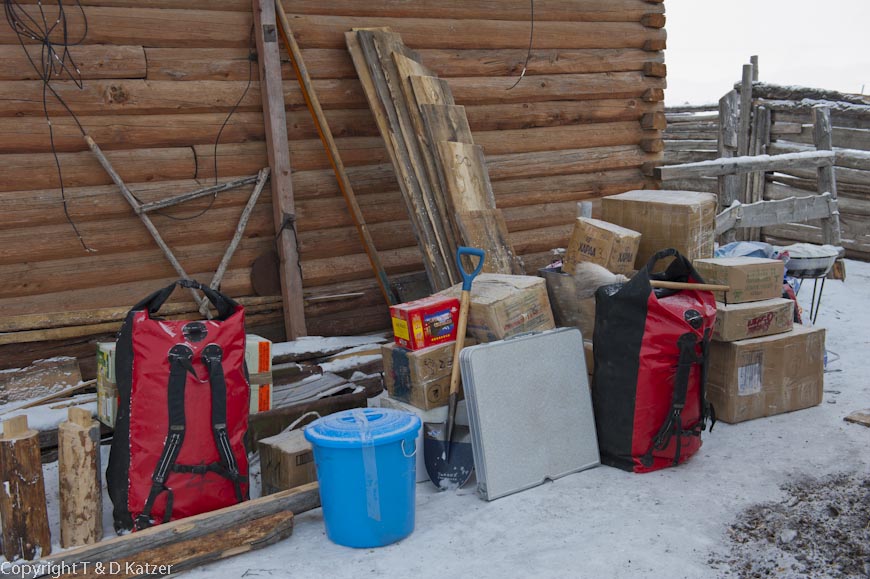
Engine damage
N 51°21'785'' E 099°21'046''
Day: 152
Sunrise:
09:27
Sunset:
17:16
Total kilometers:
1211
Soil condition:
Ice, snow
Temperature – Day (maximum):
minus 20°C
Temperature – day (minimum):
minus 30°C
Temperature – Night:
minus 30°C
Latitude:
51°21’785”
Longitude:
099°21’046”
Maximum height:
1475 m above sea level




Because Ayush announced an early start yesterday, I get up from the Wandan at 6:00 a.m., 3 ½ hours before sunrise. I immediately banish the cold in our dwelling with a warming fire. As time passes faster than we would like, we hurry to pack the rest of our clothes and equipment for transportation. As everything is stacked on the back of a truck, we try to stow our belongings as best we can in cardboard boxes and metal crates. The better we do this, the less transport damage there will be. At 8:00 a.m. Jock comes rumbling into the yurt. “Oh Hujten, huiten” (Cold, cold), he says, shaking his whole body as usual. “Maschin sain” (“Truck is good”) he adds euphorically, obviously looking forward to the journey into the taiga. “Fantastic,” I reply, offering him a cup of tea.
I called Shagai yesterday and told him about the early departure. “I’ll be with you at 8 a.m.,” he promised. It’s already 10:00 a.m. and Shagai hasn’t shown his face yet. “There is no time at Tsagaan Nuur” is the only plausible answer. Tsendmaa tries in vain to reach him on his cell phone. Then she calls a girl who lives next door to Shagai in a yurt and asks her to run over to him to wake him up. We actually get Shagai on the line. “I’ll be right there,” he replies sleepily.
Shortly before 11:00 he appears with a friend. “But we’re only paying you,” I remind him again not to hire another man. Shagai nods, whereupon his friend stands there and doesn’t help with the work. In snowfall and minus 30 °C, we drag the entire contents of the yurt plus food outside for six months. “Stop! Don’t go on,” Shagai suddenly stops us. “What’s wrong?” I ask in surprise. “It looks like the filling station is broken. There’s no gas,” he explains. “What, there’s no gasoline?” “That’s normal in Tsagaan Nuur. In sub-zero temperatures, the modern fuel gauge breaks down every now and then,” he explains. “So, what are we going to do now?” asks Tanja, shivering as she stands in front of our empty dwelling. “I don’t know,” we understand Shgai. “Well, that can’t be true. Why didn’t Jock fill up yesterday?” I ask. “Probably because he has to warm up the truck with a fire for several hours before he can start it,” answers Tanja. “That’s right. I hadn’t even thought of that,” I agree with her. To get a car ready to drive at these temperatures, a strong fire is first lit under the engine so that it warms up enough to be able to start. In addition, the cooling water is always drained completely after the journey to protect the radiator from bursting. There is no antifreeze here. This means that before the engine can be started, water is heated on the stove in order to fill it into the radiator. So it’s a huge effort of about two to three hours before you can set off. As Jock finally has his trucks ready to go, he drives to the filling station anyway, just to be on the safe side, to check in person whether the fuel gauge really is faulty. It only takes 30 minutes for him to reappear. “No gas today,” he confirms. We shrug our shoulders and are about to put everything back in the yurt when we receive further bad news. “Jock has just told me that he has water in his oil,” says Shagai as if it were the most normal thing in the world. “Water in the oil? So the truck is broken?” I ask, puzzled. “Yes.” “It’s got engine trouble?” I ask to make sure of what I’ve just heard. “Yeah. The truck’s not running. Big problem,” Shagai says, and I drop everything and walk around the log cabin to Jock’s truck. He is lying on the ice under the large engine and is draining oil. “Us”, (“water”) he says, visibly disappointed, pointing to the gray brew that is currently running into a metal barrel from the large engine of the Russian four-wheel drive truck.
“Well, that’s probably it for Ayush’s truck. I’m sure he’ll be out of action for a long time,” I say back in the yurt. “You mean they can’t fix him?” asks Tanja. “Engine damage? That’s impossible. That’s something bigger,” I reply. “And now?” “Phew, I don’t know. It’s like a spell. We just can’t get away from here. It’s really difficult to visit these Tuwas. It’s like they’ve built a wall around themselves,” I moan. “And Ayush has our money,” says Tanja. “He does,” I agree with her. “You shouldn’t have paid for everything in advance.” “Well, who knows? But as you know, he didn’t give me another chance,” I say quietly, standing in the empty yurt. However, it doesn’t take long for Ayush to pay us one of his very rare visits. “Here’s your money. My truck is broken,” he snorts, wrings a pained smile from his face and disappears again. “Who would have thought it,” I say, counting the bills. “Hm, now at least we have our money but no truck,” says Tanja.
A little later, Ayush’s neighbor shows up. “I’ll drive you,” we hear with relief. “Please give me the money so I can refuel,” we understand his words. I don’t get very far with him either with my negotiating tactics of paying the second half of the amount after the order has been completed. With insistence, I press the 150,000 into his hand. Satisfied, he puts the money away and says, “We can leave in two hours.” “I wonder if there’s gas again,” Tanja ponders. “Well, if he has to go through the whole procedure of warming up the truck and filling the radiator with hot water, the fuel pump must be working again,” I say.
Three hours later, at around 2 p.m., the neighbor comes over. We happily jump up from the chairs that we had put back in the yurt next to the stove so that at least we wouldn’t freeze while we waited. “Bendsin baihgui” (“No gas”), he says, shrugging his shoulders. “There’s still no petrol?” I ask. “Tijmee” (“Yes”), he replies. “We’re leaving tomorrow,” he adds, to which we don’t know whether to laugh or cry. Shagai and his friend now help us to drag all the equipment and furnishings back into the yurt. Another hour later, I set up our Wandan again and prepared the bed for the night.
Then I use the remaining daylight to cut a few logs with my chainsaw. Unfortunately, I didn’t do the math with the Chinese. The saw no longer starts. Annoyed, I grab the piece of junk and go to Ayush’s neighbor who recently repaired the starter. It doesn’t take long and the thing is running again. But you can’t saw with it because the motor keeps cutting out. It takes me two hours to clean the air filter and adjust the carburetor of the engine until the chainring finally turns powerfully. Now I am able to saw some firewood for the night.
Tsendmaa comes to visit us in the evening and is happy to see us. We have a rudimentary conversation as best we can. Then the phone rings. It is Bilgee with whom we have been in daily text and telephone contact since he left us. Bilgee has been busy learning English since then so that we can communicate better next year when we continue our horse trip. He reports having injured himself while cutting up logs with his chainsaw. “I had to have stitches in my finger and hand. That’s the reason why I haven’t been able to work for three days,” he reports. “Is it bad?” asks Tanja. “Not so bad. I’ll be fine,” he replies, as is typical of Mongolians, playing down injuries.
It’s already 8 p.m. when I visit the neighbor to make sure I’m ready to leave tomorrow. “My son is not at home,” says the driver’s mother. “Can he come and see us later so we can talk about the departure?” I ask her. “I’ll let him know. But please don’t drink vodka with him. Otherwise tomorrow’s taiga trip won’t work out,” she warns me.
“Oh no. From the sound of it, the driver is now inviting his friends over for drinks and celebrating the good deal. You shouldn’t have given him everything,” Tanja admonishes me. “But what was I supposed to do? He told us to use all the money for gas,” I defend myself. “Would have been better to pay him in the morning,” Tanja replies. “That’s right, it would have been better. But we’re in Mongolia. Everything works a little differently there,” I reply, once again annoyed at my incorrigible good nature. Then we crawl tiredly onto our Wandan. “I would have imagined Christmas Eve to be different somehow,” I lament meekly. “Oh what the hell. It’s one evening in our lives. We shouldn’t attach so much importance to it,” Tanja finds comforting words.
We look forward to your comments!

